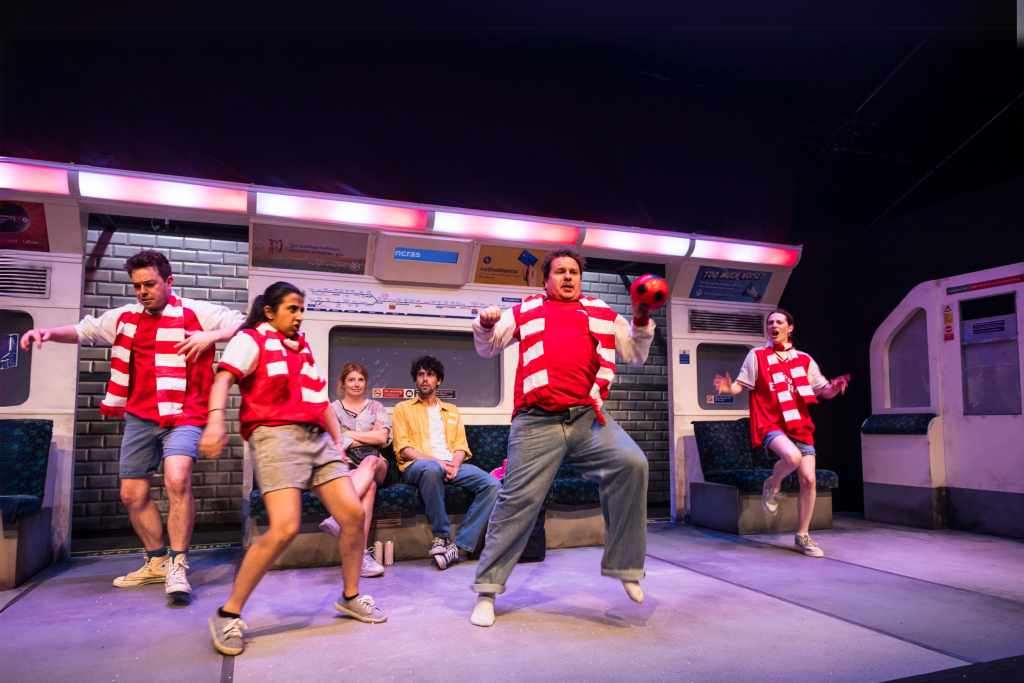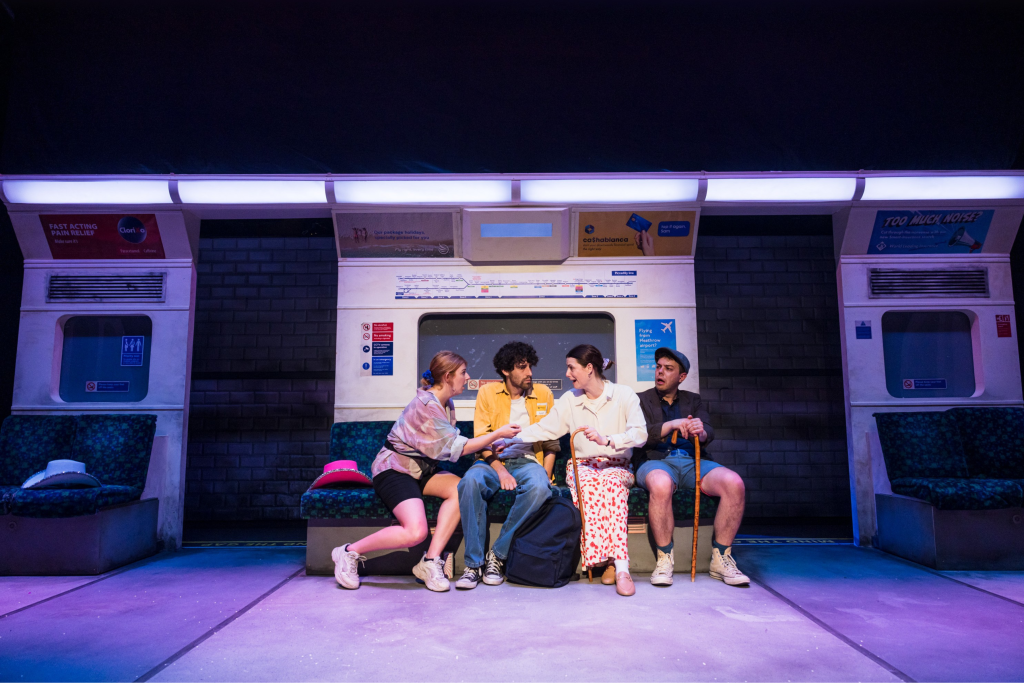You shuffle into Southwark Playhouse clutching a free sheet called Retro while a marshal in high visibility orange bellows spoof announcements through a megaphone. Inside the auditorium a battered Piccadilly Line carriage awaits complete with sticky blue seats, route maps and the faint whiff of stale sock thanks to the first passenger who proudly whips his footwear off the moment the house lights dip.
Cockfosters follows two strangers, James and Tori, who board the tube at Heathrow after disastrous holidays. He was jilted in Venice and is limping home with a cracked phone and a cracked heart; she survived a yoga retreat that morphed into nightly raves and now craves a proper cup of tea. They strike up the sort of tentative small talk most commuters avoid, keeping each other company until the Cockfosters station at the end of the Picadilly line. Each new station deposits another slice of London absurdity: lager soaked football fans roaring about Arsenal, a hen party screeching bawdy lyrics, a manspreader named Richard who consumes three seats with imperial confidence.
As the carriage hurtles north the pair bicker, bond, and eventually unite to decode a mysterious phrase left by Tori’s late grandfather who insisted she had trains in her veins. They riff about tube trivia, Victorian philanthropy and the strange romance of a network that binds a restless city together. By the time the announcer (and it’s the real Picadilly line announcer – you’ll immediately recognise the voice) announces Cockfosters the audience has witnessed a gentle rom-com blossom amid slapstick chaos and is quietly rooting for the travellers to keep talking once the doors open.
The cast of seven are superb. Sam Rees Baylis (a Stephen Mangan doppelganger, which is pointed out gleefully during the show) gives James a nervous charm. Beth Lilly’s Tori is his tonic, fizzing with optimistic disbelief whenever a fresh oddball lands in their lap. Around them four quick-change comedians conjure an entire metropolis using nothing more than accents, backpacks and the occasional novelty hat. Liam Horrigan steals a scene as an obnoxious American tourist who says leece-ester for Leicester Square and cheerily photographs everything including a discarded Pret cup. James Bryant puffs up as Richard the alpha bro, legs akimbo, dripping contempt for personal space. Natasha Vasandani ignites a monologue when someone offers her a priority seat, ranting that being perceived as old is worse than gout. Emily Waters channels a soulful busker whose Station Song rattles off twenty stops in a single breath and earns spontaneous applause. The ensemble never lets the pace sag; their comic timing is as reliable as the Elizabeth Line, a compliment rarely given to fringe comedy.

Director Hamish Clayton keeps the ride swift and seamless. A blackout and the familiar bing bong chime mark each stop, and props fly in and out with practised precision. Pre-show immersion pays dividends because the audience arrives primed to laugh at the minutiae of rail life. Even the odd burst of audience participation is low pressure and generous: a volunteer guessing the oldest Tube station gets a cheer rather than a roasting and the room bonds like strangers who have survived a stalled train together. Timing, a constant complaint on real platforms, is impeccable.
Gareth Rowntree’s set nails the claustrophobic charm of Underground decor, right down to the worn moquette pattern and scratched perspex windows (they are seats from a London bus, rather than tube train). Lighting flickers as if tunnels are whipping past and a rumbling subwoofer simulates the trains overhead that vibrated the Turbine Theatre during earlier runs. Tom Woffenden and Rich Longdon’s three snappy songs arrive like buskers on the move: a cheeky drinking chorus for the hens, a rap battle over whether north or south of the river is superior, a crooning Mind the Gap ballad that turns a safety slogan into unrequited yearning. There is some talk of extending the length from 70 to 90 minutes in a future iteration by turning it into a proper musical and adding another half dozen songs.
Beneath the silliness lies an affectionate critique of contemporary city living. Cockfosters revels in the unwritten etiquette commuters negotiate daily: should you offer your seat or risk insulting someone, is it ever acceptable to play music through phone speakers, and why do strangers clam up when simple conversation could ease the monotony?
Not every joke lands. A few punchlines aim for easy groans about bodily fluids or cheap innuendo and the show (unless converted to a musical) might benefit from losing ten minutes to tighten the late stretch. Yet it delivers a consistent hit rate of gags, and its local references reward anyone who knows which branch serves Uxbridge.
There is an echo of Richard Curtis when ‘they meet’ cute blossoms into something sweet; the last line of the show was funny, charming and completely unexpected. Cockfosters doesn’t rely on elaborate sets or big budgets; its secret weapon is recognition. You laugh because you have endured that hen party, you have dodged that manspreader, you have sighed at signal failures.
The lasting impression is of communal joy. Cockfosters may be an hour of organised chaos yet it achieves something quietly rare: it persuades a London audience to talk about serendipity and kindness on the Tube. As the tannoy in the final blackout announces that this service terminates here you find yourself wishing it carried on to Arnos Grove just to stay in that shared bubble of mirth a little longer. Catch this show before it pulls out of the Southwark Playhouse, and you may never see your morning commute the same way again.


